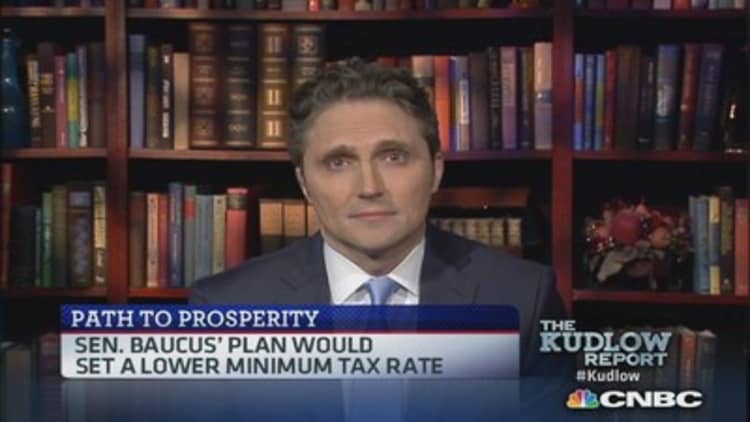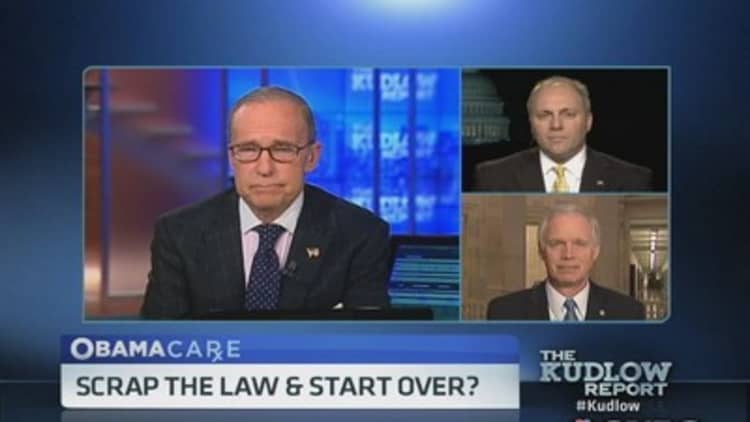Taxation of large U.S. multinational corporations would be dramatically overhauled by a raft of proposals unveiled on Tuesday by the U.S. Senate's top tax writer, though there is broad skepticism that they could become law anytime soon.
Democratic Senator Max Baucus issued a "discussion draft" that called for, among other things, repealing the present tax code provision that allows U.S. multinationals to park hundreds of billions of dollars in foreign profits offshore tax-free.
In place of this provision, known as offshore corporate income tax deferral, Baucus would impose immediate taxation of some foreign profits, though far from all of them.
Much foreign income earned by U.S. companies would be exempt entirely from taxation under Baucus' plan, which would also allow corporations to bring home their billions of dollars in profits already stored offshore at a low 20 percent tax rate.
(Read more: If Fed minutesreveal taper talk, watch yields)

The Baucus proposals come at a time when hopes for comprehensive U.S. tax code reform before 2015 have all but vanished, while concern rises about corporate tax avoidance elsewhere in the world, including among key U.S. allies.
Congress is still deeply divided over fiscal policy, including taxes, but President Barack Obama said on Tuesday that there was "not that much separation between what Democrats are talking about" and what some Republicans seek on taxes.
Speaking at a Wall Street Journal conference in Washington, the president said, "This should be bridgeable."
He cautioned, however, against any plan seeking to cut corporate taxes without also closing tax loopholes. "We would then blow another hole in the deficit that would have to be filled. And what I'm not willing to do is to have higher rates on the middle class in order to pay for that," he said.
'Just a first step'
The top U.S. corporate income tax rate is one of the highest in the world at 35 percent, though few multinationals pay it thanks to an abundance of loopholes available to them.
(Read more: Hate your job? You probably live in the US)
An estimated $2 trillion in foreign profits is being held offshore by U.S. multinationals to avoid paying tax on it.
The Baucus proposals include the idea of a global minimum tax for U.S. corporations, with various distinctions between active and passive income, as well as income derived from goods and services sold into U.S. markets and into foreign markets.
Baucus said the proposals were not a final plan and were meant to spark discussion. "This is just a first step," he said.
He did not say when he might offer his plan as legislation. He said in April he will not seek re-election next year.
The U.S. tax code has not been thoroughly revamped since 1986. Since then, it has been weighed down by hundreds of tax breaks—such as the mortgage interest deduction and the research credit—now deeply embedded in the economy.
(Read more: Superbear Marc Faber sees market opportunities)
This has made the politics of tax reform so difficult that successive presidents and Congresses have tried, but failed to tackle it. Analysts hold out little hope that the present dysfunctional Congress is capable of taking on such a task.
Robert Willens, a noted corporate tax and accounting analyst, said it was difficult to see tax-reform proposals "getting through such a fractious Congress."
"Congress has great difficulty agreeing on matters that are much less controversial and complex than comprehensive tax reform is likely to be," he said.
Baucus and camp still talking
Nonetheless Baucus, like Republican Representative Dave Camp, chairman of the tax-writing House of Representatives Ways and Means Committee, has continued to discuss possibilities.

Baucus offered several options in his discussion draft:
- Taxing passive and highly mobile corporate offshore income annually at full U.S. rates;
- Doing the same for income from sale of goods and services to U.S. customers, with some exceptions;
- Taxing income from sales into foreign markets either at 80 percent of the full rate with full foreign tax credits and an exemption for earnings brought into the United States; or at 60 percent of the full rate if derived from active business, 100 percent if not, and a full exemption for repatriated earnings;
- Limiting interest deductions for companies commensurate with foreign profits held offshore tax-free and leverage;
- Eliminating part of the 'check the box' rule that lets companies disregard certain foreign units for tax purposes; and
- Letting foreign profits already held tax-free offshore to enter the United States at "a one-time tax at a reduced rate of, for example, 20 percent payable over eight years."
This last item reminded some analysts of President George W. Bush's 2004 offshore profit repatriation tax "holiday." It was meant to boost the economy, but led largely to a spurt of stock buybacks and corporate takeovers instead.
"Why are we so in love with the idea that we should tax foreign profits less than domestic profits?" asked Bob McIntyre, director of Citizens for Tax Justice, a tax activist group.
—By Reuters


